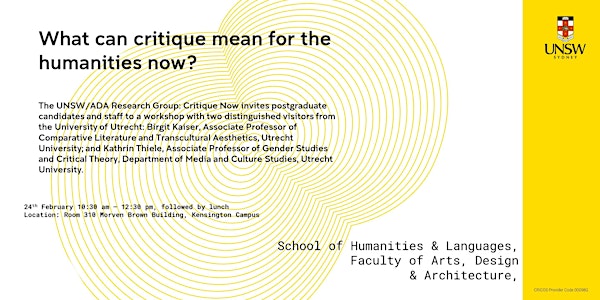
What can critique mean for the humanities now?
UNSW/ADA Research Group: Critique Now invites postgraduate candidates and staff to a workshop
Date and time
Location
Morven Brown Building
Room 310 Kensington, NSW 2052 AustraliaAbout this event
We will begin with brief presentations from each of the guests on their respective chapters, plus a presentation from Timothy O’Leary on the Harcourt text (details below).
The majority of the session will be dedicated to open, critical reading and discussion of the themes raised, with particular emphasis on the question of how we can develop critical methodologies in humanities and social sciences disciplines that effectively address our contemporary world.
In 2022, the group Critique: A network in social political and legal thought, was re-launched as Critique Now, a UNSW ADA Faculty-supported research group that comprises researchers from multiple disciplines, including philosophy, critical legal theory, political and social theory, history, sociology, and cultural theory. The group aims to generate and support inter-disciplinary research that develops new modes of practicing critique in the humanities and social sciences, broadly conceived. It has a particular focus on collaborative work that engages and supports postgraduate and early career researchers working in these fields. If you are an HDR candidate or staff member and want to get involved, please email one of the core members: Timothy O’Leary, Jessica Whyte, Heikki Ikäheimo, Ben Golder, Daniel McLoughlin, Melanie White, Kasia Jezowska.
This event is open to all HDR candidates and other interested staff members across UNSW.
Place/Time:
Friday 24 February 2023, 10:30am-12:30pm (followed by lunch).
Room 310, Morven Brown Building, Kensington Campus.
Readings:
The texts for this workshop will be drawn from two books:
1/ Kaiser, B.M., Thiele, K. and O’Leary, T. (eds). The Ends of Critique: Methods, Institutions, Politics. London: Rowman & Littlefield, 2022.
Click on the “Features” tab here for Open Access:
https://rowman.com/ISBN/9781786616463/The-Ends-of-Critique-Methods-Institutions-Politics
Read:
Chapter 1. “After Humanism?” Time and Transformation in Critical Thinking, by Kathrin Thiele.
Chapter 6. The Ends of Critical Intimacy. Spivak, Fanon, and Appropriative Reading, by Birgit M. Kaiser.
2/ Fassin, D. and Harcourt, B. (eds). A Time for Critique. Columbia University Press, 2019.
Read:
Chapter 14. Critical Praxis for the Twenty-First Century, by Bernard E. Harcourt.
For access to the readings, please email Timothy O’Leary (t.oleary@unsw.edu.au).
Guest Speaker Bios:
Birgit Kaiser, Associate Professor of Comparative Literature and Transcultural Aesthetics, Utrecht University.
Birgit's research spans literatures in English, French and German of the 19th to the 21st century, with a focus on literature as a mode of poetic knowledge production, on the relation of literature, aesthetics and affect, as well as on writing subjectivity in transcultural and post/colonial constellations of power. Her publications include Figures of Simplicity: Sensation and Thinking in Kleist and Melville (SUNY 2011); and several edited collections, including most recently The Ends of Critique: Methods, Institutions, Politics (Rowman & Littlefield 2022).
Kathrin Thiele, Associate Professor of Gender Studies and Critical Theory, Department of Media and Culture Studies, Utrecht University.
Kathrin’s research engages with questions of critical inquiry, ethics, and politics from queer feminist, decolonial and posthuman(ist) philosophical perspectives. Her work intervenes in discussions around differences, in/equality, de/coloniality, ecologies and post/humanisms, and her critical attention lies most of all with the troubling consequences of a relational understanding of the world, that is with the inherent frictions, the processes of in/exclusion and the always asymmetrical relations we inhabit. Her publications include the monograph, The Thought of Becoming (Diaphanes, 2008), and several edited collections, including most recently The Ends of Critique: Methods, Institutions, Politics (Rowman & Littlefield 2022), and many journal articles and book chapters.
In 2012, Kathrin and Birgit together founded Terra Critica: Interdisciplinary Network for the Critical Humanities . This research consortium consists of an international group of researchers engaged in re-examining critique under the conditions of the twenty-first century and strengthening the Critical Humanities as a crucial site for meaningful analyses of our present.